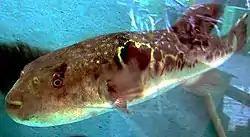河豚
Chinese
| river | suckling pig | ||
|---|---|---|---|
| trad. (河豚) | 河 | 豚 | |
| simp. #(河豚) | 河 | 豚 | |
| alternative forms | 河魨/河鲀 pufferfish | ||
Pronunciation
Hyponyms
- (Min Nan) 刺䲅/刺𫚜
Derived terms
- 河豚毒素 (hétún dúsù)
Japanese

河豚 (fugu, katon): a blowfish in a tank.
Etymology 1
| Kanji in this term | |
|---|---|
| 河 | 豚 |
| Grade: 5 | Grade: S |
| jukujikun | |
In light of the older pronunciation fuku,[1] most likely derived from the verb 吹く (fuku, “to blow”), perhaps from the way the fish blow sand to find food. Alternatively, related to the verb 膨れる (fukureru, “to swell up, to expand”).
Noun
河豚 or 河豚 • (fugu)
Usage notes
- The kanji spelling is uncommonly used. Usually spelled in kana.
- As with many terms that name organisms, this term is often spelled in katakana, especially in biological contexts (where katakana is customary), as フグ.
Descendants
- English: fugu
Etymology 2
| Kanji in this term | |
|---|---|
| 河 | 豚 |
| か Grade: 5 |
とん Grade: S |
| kan’on | |
From Middle Chinese 河豚 (MC ha dwon, literally “river + pig”). Compare modern Mandarin reading hétún.
Usage notes
This reading is less common than fugu above.
References
- Shōgaku Tosho (1988) 国語大辞典(新装版) [Unabridged Dictionary of Japanese (Revised Edition)] (in Japanese), Tōkyō: Shogakukan, →ISBN
- Matsumura, Akira, editor (2006), 大辞林 [Daijirin] (in Japanese), Third edition, Tōkyō: Sanseidō, →ISBN
- NHK Broadcasting Culture Research Institute, editor (1998), NHK日本語発音アクセント辞典 [NHK Japanese Pronunciation Accent Dictionary] (in Japanese), Tōkyō: NHK Publishing, →ISBN
- Kindaichi, Kyōsuke et al., editors (1997), 新明解国語辞典 [Shin Meikai Kokugo Jiten] (in Japanese), Fifth edition, Tōkyō: Sanseidō, →ISBN
This article is issued from Wiktionary. The text is licensed under Creative Commons - Attribution - Sharealike. Additional terms may apply for the media files.